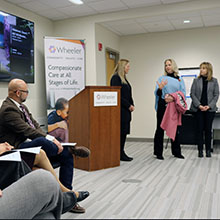Twenty Years of Building Stronger Families

“Relentless empathy” helps families succeed in MST-BSF
Dozens of attendees honored an anniversary in Bristol for two decades of a highly successful model of home-based behavioral health treatment.
Multisystemic Therapy – Building Stronger Families (MST-BSF) is an intensive home-based treatment approach for families with children ages 6-17 involved with the Connecticut Department of Children and Families (DCF) protective services due to neglect and physical abuse concerns where there is also a concern about the impact of parental substance abuse on the family. The mission of MST-BSF is to keep families together, assure that children are safe, prevent abuse and neglect, eliminate parental substance misuse, reduce mental health difficulties experienced by adults, and children and increase natural social supports.
A central part of the model is empirically supported treatment focused on monitoring and treating parental substance abuse.
Wheeler was intimately involved in the development of the MST-BSF model in 2004–2005 and continues to be a leading provider around the state. The testing of the MST-BSF model’s effectiveness included extensive data collection, with both a pilot study and a randomized clinical trial with the clinical services provided by Wheeler staff.
The anniversary event was attended by the three original team clinicians from 20 years ago, as well as current staff. All three of the original clinicians remarked about how the experience had promoted and shaped their clinical skill development.
All at the celebration involved in the early days remarked at the phenomenal partnership that the model required and strengthened between DCF and the clinical team.
“Wheeler was at the table for this before there even was a table,” one of the original organizers at DCF said at the event. “It’s taken relentless empathy and relentless compassion.”
Elisabeth Cannata, Ph.D., vice president, community-based family services & practice innovation at Wheeler, received recognition from the model developers for her leadership in the creation of MST-BSF, as did DCF. Wheeler, DCF, and researchers worked side-by-side as a team in the research, training, and implementation, a unique relationship at the time.
Since February 2005, nearly 500 families nationally have completed care in MST-BSF model programs and been discharged, with nearly 90 percent completing treatment. The ultimate outcomes have proven remarkably successful across the country:
- More than 95% of youth remained living at their home;
- About 90% of caregivers had no new reports of child maltreatment, or new arrests; and
- Over 87% of youth showed improvement in mental health functioning.
- And more
Instrumental national figures in the model development, Dr. Cynthia Cupit Swenson, from the Medical University of South Carolina, Dr. Cindy Schaeffer, from the University of Maryland – Baltimore, and Angelia Watson, MA, Manager of MST-CAN Transport, MST Services, joined the event, and shared a statement to mark the anniversary.
“On this occasion of the 20th anniversary of MST-BSF in Connecticut, we would like to recognize you and thank you for your part in this success. Over these 20 years, many have played a role in providing comprehensive evidence-based services to families with serious clinical needs. Many have contributed to working with families, providers, and DCF to keep families safely together and to overcome the impact of substance misuse and child abuse and neglect. Families have become stronger. Whether you have worked with MST-BSF for 1 week or 20 years, you are a part of this success.
MST-BSF was started by a request from Connecticut Department of Children and Families to develop a family-based model for co-occurring child physical abuse and neglect and parental substance misuse. This intensive early work on development and implementation involved a partnership between DCF Central office, DCF Region 6, The Medical University of South Carolina, and Wheeler. The result was the MST-BSF model that has since proven successful through rigorous research. DCF has funded the implementation of this model for 20 years, which underscores their commitment to effective practices for families with some of the most complex situations. The quality of MST-BSF care provision over this period is a testament to the numerous high-quality treatment provider organizations throughout the state doing this important work.
We are grateful to DCF for their commitment to the implementation of MST-BSF. We are grateful to the families who have participated in MST-BSF. We are grateful to each of you. You are making a difference!”




